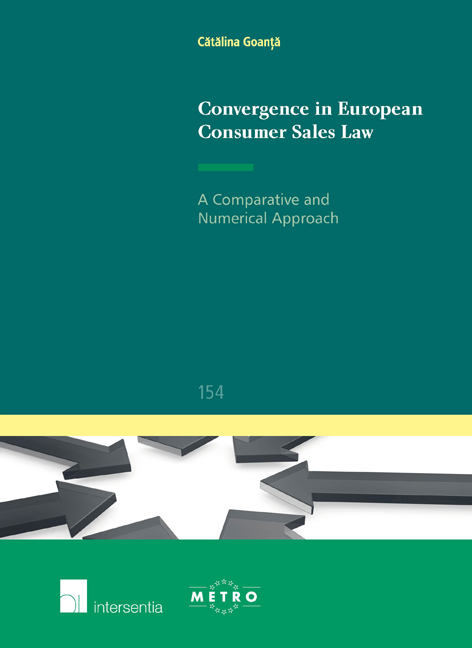Book contents
- Frontmatter
- Dedication
- Acknowledgements
- Contents
- List of Abbreviations
- List of Tables and Figures
- Chapter 1 Introduction
- Chapter 2 The Substantive Comparison
- Chapter 3 The Numerical Analysis
- Chapter 4 Conclusions and Recommendations
- Summary
- Valorisation Addendum
- Relevant Documents
- Bibliography
- Other Literature
- Curriculum Vitae
- Ius Commune Europaeum
Chapter 4 - Conclusions and Recommendations
Published online by Cambridge University Press: 13 December 2017
- Frontmatter
- Dedication
- Acknowledgements
- Contents
- List of Abbreviations
- List of Tables and Figures
- Chapter 1 Introduction
- Chapter 2 The Substantive Comparison
- Chapter 3 The Numerical Analysis
- Chapter 4 Conclusions and Recommendations
- Summary
- Valorisation Addendum
- Relevant Documents
- Bibliography
- Other Literature
- Curriculum Vitae
- Ius Commune Europaeum
Summary
General Conclusions
This study aimed to bring a fresh contribution to the already-existing debate surrounding European consumer contract law. It did so by directing the discussion on two different paths – a comparative substantive overview and a mirroring numerical analysis. Three methodological conclusions can be mentioned in the light of this effort, and they are presented in what follows.
(i) Identifying a gap in the present discussion about the harmonisation of European consumer law
Firstly, as highlighted in Chapter 1, the harmonisation discussion is by no means novel. An ever-growing body of literature proves an increased interest in the field of European contract law, or more specifically, European consumer law. Recent developments such as the adoption of the Consumer Rights Directive or the withdrawal of the CESL announce thought-provoking times for contract lawyers. However, the nature of consumer contract law in itself, as well as the ever-growing body of knowledge that disseminates it, create a highly complex field that becomes more and more difficult to grasp in its entirety.
Moreover, while many authors venture into analysing specific Directives or national legal regimes, the attention paid to comprehensively studying the legal convergence arising from European consumer developments is not directly proportionate. Little attention is paid to the extent to which harmonisation, as a specific policy pursued by the European Commission leads to legal convergence as the effect of this policy. What is more, it is safe to say that to date, with the exception of the Convergence Index included in this study, no measurement tool has been developed to quantitatively assess this extent. For this reason, a gap has been identified in the harmonisation debate as it currently stands.
(ii) Filling the gap by developing a self-standing method
Secondly, the present study aims to fill the aforementioned gap. By developing a methodology that helps establish whether and to what extent there is convergence of laws in the field of European consumer contract law, this study wishes to further the academic and policy debates on the effects of European legislative design.
- Type
- Chapter
- Information
- Convergence in European Consumer Sales LawA Comparative and Numerical Approach, pp. 295 - 312Publisher: IntersentiaPrint publication year: 2016



